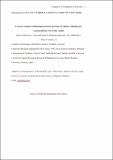Low-level temporal coding impairments in psychosis: Preliminary findings and recommendations for further studies.

View/
Date
2011Author
Schmidt, Heike
McFarland, John
Ahmed, Mohamed
Elliott, Mark
Metadata
Show full item recordUsage
This item's downloads: 736 (view details)
Recommended Citation
Schmidt, H., McFarland, J., Ahmed, M., & Elliott, M. A. (2011). Low-level temporal coding impairments in psychosis: Preliminary findings and recommendations for further studies. Journal of Abnormal Psychology (In press).
Abstract
We investigated whether difficulties with temporal event-coding, previously reported in patients with schizophrenia, are already present during first-episode psychosis (FEP). In this experiment, the subjective judgements of the simultaneity of visually presented stimuli were compared between 11 healthy controls, 9 chronic schizophrenia (CSZ) and a sample of 11 FEP patients. Participants were asked to indicate whether two vertical bars appeared at the same time or at different times on a computer monitor. CSZ patients' thresholds were elevated while the FEP sample also showed higher thresholds relative to controls. Although preliminary, these findings indicate a generalised disturbance in event-structure coding at early stages of psychosis and question the specificity of its disturbance. Considering the proposed relationship between event-structure coding and the experience of time in general, our study recommends future studies refocus on psychosis in general rather than on schizophrenia as a particular case of abnormal temporal processing. In addition, we suggest that the relevant psychopathology will be best determined by means of a comprehensive analysis of low-level temporal coding performance in different forms of psychosis.

